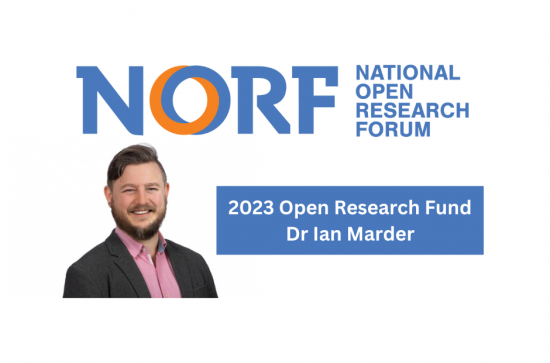
Project with almost 40 partners aims to embed a culture of interdisciplinary open research in criminal justice in Ireland by establishing new partnership
On 2 October 2023, a new project commenced at Maynooth University, with €75,798 of funding from the National Open Research Forum (NORF) Open Research Fund. Led by Dr. Ian Marder (Assistant Professor in Criminology and Co-Deputy Director of the Research Centre for Criminology at the School of Law and Criminology), the aim is to embed a culture of interdisciplinary open research in criminal justice in Ireland.
Project partners representing nearly 40 organisations will form a ‘Researcher-Policymaker-Practitioner Partnership’. Partners include universities and technological universities, criminal justice policymakers, agencies and oversight bodies, third sector justice services, civil society and minority advocacy bodies, and research infrastructure. The Partnership will seek to determine collectively how to coordinate and embed a culture of open research among criminal justice researchers and in the criminal justice sector in a locally appropriate way.
The project recognises the potential for interdisciplinary open research to inform criminal justice policy and practice in Ireland, advancing public safety, health and equality. At present, however, researchers and criminal justice stakeholders have few opportunities to co-create open research and exchange and apply research knowledge openly across the sector.
The project involves a programme of engagement and research. Partners will meet three times in 2024 to decide collectively how to stimulate and advance the uptake of open research. They aim to co-create the principles of engagement, to investigate the sector’s open research needs, to explore international best practice in criminal justice open research partnerships, and to co-create a national open research agenda, priorities and action plan. All partners will be invited to co-author these for publication.
The grant will also support a study exploring international best practice in open research partnerships in criminal justice. This will be disseminated widely and used to inform the Partnership’s work.
The project is coordinated by a consortium that includes Maynooth University, Dublin City University, South East Technological University, Technological University Dublin and the University of Limerick.
On the project’s launch, Ian said: ‘This is a huge opportunity for Ireland’s research, policy and practice communities to come together and identify on what we can agree, and where we want criminal justice research in Ireland to go. Research partnerships are burgeoning, so it’s the right time to reflect on the big picture, build relationships and establish shared principles and priorities.’
Ben Ryan, Head of Criminal Justice Policy in the Department of Justice, welcomed the initiative, saying: ‘We are fully committed to drawing on research evidence to inform our policy-making process and this partnership will provide a great opportunity to further embed and expand upon research partnerships already in place.’
Dr. Fionnuala Brennan, Lecturer at South East Technological University (SETU) School of Humanities, and Project Consortium member, said: ‘A focus of our work at SETU is to deliver high-quality, research-led teaching for all our students, including Recruit Prison Officers. Being involved in collaborative open research will inform and enhance innovation on our programmes and help bring current thinking and practice to the sector, faster and more effectively.’
Shawna Coxon, Deputy Commissioner of An Garda Síochána, said: ‘The National Open Research Forum project will bring together the academic community and criminal justice sector practitioners to work on some of our most difficult challenges. In partnership, we will be exploring best practices to reduce victimisation and support vulnerable persons. It’s an exciting opportunity to co-create a better future together.’
Donna Creaven, Director of Corporate Services in the Irish Prison Service, said: ‘The Irish Prison Service are delighted to be a partner of, and very much welcome, the NORF project. Research evidence is very important to the development of criminal justice decision-making. Through well-designed and implemented research, we can better explore the impact of policies, programmes, and daily practices that improve our societal impact and how the justice ecosystem works for the betterment of those in our care and society.’
Dympna Kenny, General Manager of Victim Support at Court, said: ‘This project is a great opportunity to bring together such a broad group of stakeholders and researchers to collaborate. The information sharing across the group will be so beneficial in working towards achieving the project’s goal: to embed a culture of open research among Ireland’s criminal justice researchers and its criminal justice sector.’
Helen Hall, Chief Executive of the Policing Authority, said: ‘The Policing Authority is delighted to participate with Dr. Marder and other project partners in creating a culture of open research among Ireland’s criminal justice researchers and practitioners. Open, collaborative and transparent research has the potential to bring considerable benefits to all agencies striving to build safer and stronger communities, and the Authority looks forward to actively engaging on this.’
If your organisation is yet to be represented on the project, please contact [email protected] to find out more.
Note to editors:
NORF uses the UNESCO definition of open research as including all practices that aim to make research knowledge openly available, accessible and reusable, increase research collaborations and information sharing for the benefit of research and society, and open the process of knowledge creation, evaluation and communication to societal actors beyond the research community. Drawing on Hamilton’s outline of criminal justice cultures, a ‘culture of open research’ in our sector means one in which individual and institutional behaviours and attitudes align with these principles of open research.
